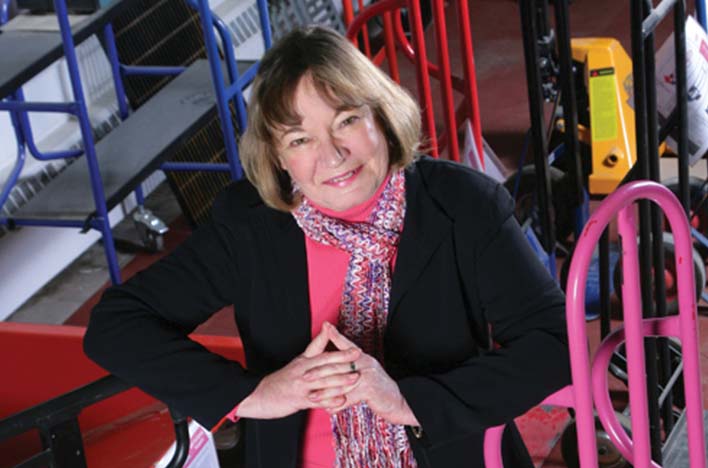Thirty years ago, Mary Lou Jacoby, the founder of Warehouse 1, was a 30-something single mom who had recently left a family business and was “looking for a way to feed my kid.”
An auction company had a building full of old, used equipment at 33rd and Forest. Jacoby, who had a background in the scrap business, thought the retail shelving, custom cabinets for storage, conveyor belts, fork lifts and other items that hadn’t already been sold at auction could be resold to other companies if they were cleaned up a little.
“The building was completely crammed full from the back wall to the front door. It was like Grandma’s attic on steroids,” Jacoby said.
She struck a deal to buy the building, paying the loan by reselling the used inventory. She sold it all, and repaid the loan in 90 days. Warehouse 1, an international provider of new and used warehouse and storage equipment, was born. Jacoby has been turning salvage into success ever since. And, this year, she decided to share that success with her staff when she led Warehouse 1’s employees through an Employee Stock Ownership Plan (ESOP).
Jacoby recently shared with Thinking Bigger Business some of the things she’s learned during her three decades as a business owner.
- You don’t know what you can get unless you ask. // When Jacoby got the idea to buy the building by selling its contents, she had no idea whether the owner would agree. But she told herself that she wouldn’t have a chance if she didn’t ask. “So I asked,” she said.
- Don’t be afraid to let go. // “Learning what not to do was probably one of the primary things that was in my way of success for a long time,” Jacoby said. Over the years, she’s had to learn what was profitable to sell and what wasn’t. She realized, for example, she couldn’t sell file cabinets cheaper than Office Depot anymore. “It’s hard to let go of something,” she said, “but it’s important to understand what you do that makes money and what you do that’s a detraction from what you do that makes money.”
- Take advantage of resources. // Joining NAWBO and HEMP were two great investments of time as Jacoby grew Warehouse 1. “It’s important to be open to new ideas and learning. It’s unfortunate that some people think it’s more valuable to sit at their desk with their head down rather than sitting in a room with 50 to 100 of the smartest people in the city gathering ideas and new concepts,” she said.
- “Get over yourself.” // That’s advice Jacoby got early on, and she’s never forgotten it. “When you’ve made a decision that didn’t work out, move on,” she said.
- Plan your exit. // “I didn’t want to be driving into the warehouse in my wheelchair each morning,” Jacoby said. “It just didn’t seem like the right way to go out.” So she started looking for exit strategies, including the ESOP, and even formed an internal team to consider options. She said that to ensure continued success of an ESOP company, you need a dedicated team of talented people to guide it forward. They need to make good decisions for the company and the other employee-owners to be successful. // wh1.com

